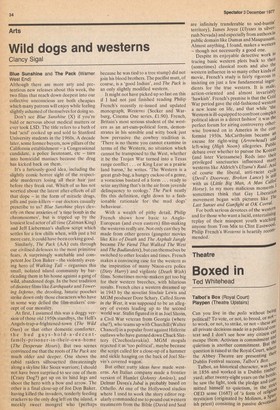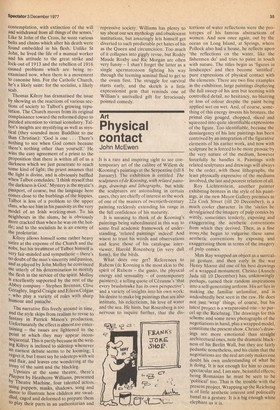Theatre
Boxed in
Ted Whitehead
Talbot's Box (Royal Court) Playpen (Theatre Upstairs) Can you live in the polis without beill political? To vote, or not, to breed, or not': to work, or not, to strike, or not — these all private decisions made in a political COPT; text and I don't see how any citizen ca'ij escape them. Activism is commitment all„ quietism is another commitment. But tn" question is raised.at the Royal Court, wher.cr the Abbey Theatre are presenting the Dublin Festival success, Talbot's Box. Talbot, an historical character, was h°1',., in 1856 and w,orked in a Dublin tirnhe' yard; after twenty-eight years qn the bottle: he saw the light, took the pledge and cOt mitted himself to quietism, in the st,r1c05 OED sense (1687) of 'a form of religl°11, mysticism (originated by Molinos, a SP& ish priest) consisting in passive devotion contemplation, with extinction of the will and withdrawal from all things of the senses.' Like St John of the Cross, he wore various belts and chains which after his death were found embedded in his flesh; Unlike St John, he lived the life of a manual worker and his attitude to the great strike and lock-out of 1913 and the rebellion of 1916 caused problems which are being reexamined now, when there is a movement to canonise him. For the Catholic Church, he's a likely saint: for the socialist, a likely scab.
Thomas Kilroy has dramatised the issue by showing us the reactions of various sections of society to Talbot's growing reputation, The Church moves from its original complaisance toward the reformed dipso to Puzzled attention to virtual iconolatry. Talbot's insights are mystifying as well as mystical (they sounded more Buddhist to me than Christian): 'God is one . . There's nothing to see when God comes because there's nothing other than yourself.' He wins the easy agreement of a priest to the Proposition that there is within all of us a darkness which we just penetrate to reach some kind of light; the priest assumes that the light is divine, and is obviously baffled When Talbot concludes: 'I think myself that the darkness is God.' Mystery is the mystic's Passport, of course, but the language here comes close to the burblings of the hippies. Talbot is less of a problem to the upper class, who see him in his passivity as the very model of an Irish working-man. To his neighbours in the slums, he is obviously more cracked than when he was on the bottle; and to the socialists he is an enemy of the proletariat.
Kilroy allows himself some rather heavy satire at the expense of the Church and the nobs, but his treatment of Talbot himself is very fair-minded and sympathetic — there's no doubt of the man's sincerity and passion, and as played by John Molloy he convinced me utterly of his determination to mortify the flesh in the service of the spirit. Molloy IS excellently supported by the rest of the Abbey company — Stephen Brennan, Clive Geraghty, Ingrid Craigie and Eileen Colgan — who play a variety of roles with sharp humour and panache.
The narrative flits freely around in time, and the style skips from realism to revue to fantasy in Patrick Mason's production. Unfortunately the effect is almost too entertaining — the issues are lightened to the Point at which they may appear incons. equential. This is partly because in the writing Kilroy is inclined to sidestep whenever an earnest debate seems to be looming; I regret it, but I must say he sidesteps with wit and flair, and leaves one wondering at the irony of the saint and the blackleg.
Upstairs at the• same theatre, there's Playpen by Heathcote Williams, presented by Theatre Machine, four talented actors using puppets, masks, shadows, song and dance to illustrate how children are swaddled, caged and deformed to prepare them to play their parts in an authoritarian and repressive society. Williams has plenty to say about our sex mythology and obsolescent institutions, but amazingly lets himself get diverted to such predictable pet hates of his as the Queen and circumcision. Too much of it collapses into giggly revue, but Roddy Maude Roxby and Ric Morgan are often very funny — I shan't forget the latter as a single spermatozoon fighting his way through the teeming seminal fluid to get to the ovum first. The struggle for survival starts early, and the sketch is a little expressionist gem that reminds one of William's unrivalled gift for ferociously pointed comedy.











































 Previous page
Previous page